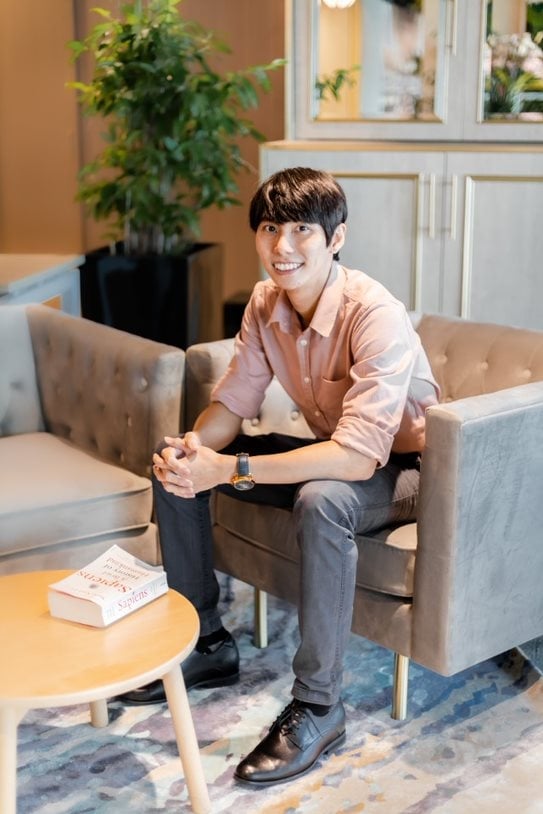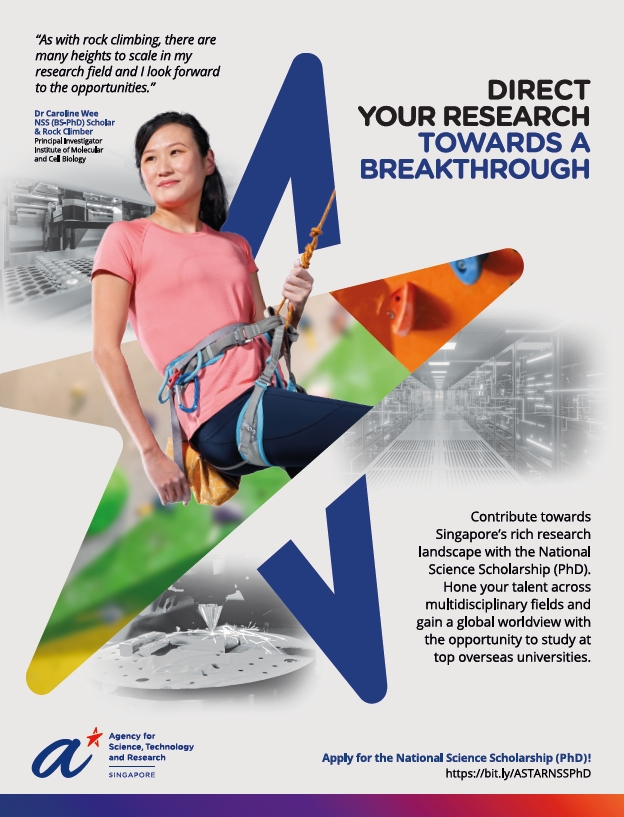Left: Ang Yuen Siang explores the possibilities of the human body in his role as a Research Scientist at the Institute of High Performance Computing. He is a National Science scholar, and received his Doctor of Philosophy in Clinical Neurosciences from the University of Oxford.
Right: Swathi Nachiar Manivannan is a Research Officer at the Bioinformatics Institute (BII). She is a recipient of the National Science Scholarship, and holds a Bachelor of Arts (Hons) in Natural Sciences (Genetics) from the University of Cambridge. Outside of work, Swathi is an accomplished player of the veena, a traditional Indian string instrument.
The Agency for Science, Technology and Research (A*STAR) plays a key role in bringing Singapore’s research and innovation to market, as well as nurturing scientific talent and leaders for the research, innovation and enterprise ecosystem.
Meet Swathi Nachiar Manivannan, 22, who has just embarked on a career with A*STAR as a Research Officer at the Bioinformatics Institute (BII), and Ang Yuen Siang, 33, a Research Scientist at the Institute of High Performance Computing (IHPC).
Their research experiences may differ, but they are both driven by their curiosity and innate thirst for knowledge. We spoke with Swathi and Yuen Siang, who shared their motivations and aspirations.
How did you get interested in pursuing a career in research?
Swathi: I remember when I was about six years old, I’d read a short comic on how Edward Jenner developed the first vaccine against smallpox. At the end of the comic there was a blurb on how vaccines were developed, and that there was no vaccine for HIV as it was extremely challenging to do so given the nature of the virus. I was really inspired by that comic and dreamt of developing vaccines against various pathogens, including HIV! While my research interests and aims in life have since shifted quite a bit, I think that was probably the start of my interest in wanting to become a scientific researcher.
Yuen Siang: I have always been a curious person growing up and I like to read about different things, tinker with all sorts of stuff and solve a variety of puzzles. Hence, a career in research was a natural fit for me - but I actually never considered it until college. During my first year as an undergraduate in Nanyang Technological University (NTU), I had the good fortune of being able to help out with research in Professor Alfred Huan’s lab. That was a wonderful experience because we had to develop and experiment with solutions to problems for which no answer existed in textbooks. Every day was intellectually stimulating and I decided, by my third year, that I wanted to be a scientist.

Swathi Nachiar Manivannan
There are many options for a researcher. Why did you choose to embark on a career with A*STAR?
Swathi: I appreciated that A*STAR allows for several career routes within the scientific research scene. A*STAR gives me the flexibility of switching to an industry-based career, moving into doing policy work, or having my own start-up.
Yuen Siang: My research focuses on mental health and seeks to improve healthcare as well as maximise human potential in Singapore. As the lead government agency for research and innovation, A*STAR is well-positioned at the intersection between academia, industry and clinics. That makes it a breeze for me to work with domain experts at other A*STAR research institutes, universities, hospitals and public sector agencies towards meaningful and impactful outcomes.
Both of you accepted the National Science Scholarship. How had A*STAR supported you as a scholar?
Swathi: Scholars have the opportunity to do an 8-week research attachment in one of the A*STAR Research Institutes (RIs) after their first year at university, which I appreciated, as it gives me a better idea about working in A*STAR. In addition, A*STAR provides financial support for overseas summer research attachments, which will definitely broaden horizons.
Yuen Siang: A*STAR provides a tremendous support network that allowed me to pursue my studies with confidence. I was assigned a mentor who was always ready to help and would check in regularly on my academic life and mental health. A*STAR senior management makes time to meet, interact and listen to scholars when they are on business trips around the region. Finally, the scholarship officers at A*STAR Graduate Academy also tended to our administrative and non-administrative needs with great efficiency, which allowed us to pursue our studies without any worries.

Ang Yuen Siang
What are you working on at the moment?
Swathi: As part of my one-year Research Attachment, I’m assisting with ongoing research projects at A*STAR’s Bioinformatics Institute. Part of the work that my research group does pertains to the curation and analysis of SARS-CoV-2 genome sequences submitted on the global platform GISAID. I’m proud that the work we’ve done with GISAID has helped to share information relating to the COVID-19 pandemic globally and in a timely manner, so public health officials can make informed decisions.
Yuen Siang: My research uses a combination of techniques, specifically machine learning, neuroimaging, behavioral testing and computational modelling, to understand the neurocomputational mechanisms underlying “depressive-like” endophenotypes such as motivation, emotional regulation, cognitive dysfunction and reward processing. I am currently running studies involving brain scans of healthy adults and depressed patients, behavioral testing of motivation in adolescents as well as machine learning predictive modelling of mental health onset in youths.
What do you hope to achieve in your career?
Swathi: I hope to be able to make significant contributions in the field of infectious disease ecology and evolution, and through my research, help develop and implement solutions that would improve pandemic preparedness, allowing for the mitigation and control of the spread of various infectious diseases. I also hope to be an effective science communicator and reach a position where I can mentor and inspire future students to also pursue scientific research careers.
Yuen Siang: My goal is to develop a strong local and international reputation in motivation-related mental health issues. By continuing to engage relevant stakeholders in the local ecosystem as well as international collaborative partners, I aim to increase the global adoption rate of scientific tools that I have developed and make them the standard for self-report and computerized assessments of motivation in health and disease. These include tools like an option generation computerized test, motivation self-report scale, cognitive motivation computerised test, and computational modelling of behaviour software.
Finally, what would you say to someone who is considering a career in research?
Swathi: If you’re passionate about science, want to contribute to the scientific community, and translate your research into tangible, beneficial outcomes for society, A*STAR’s the place where you can do that!
Yuen Siang: A*STAR offers a strong foundation and a holistic learning journey to help you become more than what you think you could have ever been. They offer support and networks to ensure that you can focus on getting the best out of your academic journey as a scholar. Upon completion of your studies, there are a variety of career pathway options to explore within this large organisation and I am certain that you will be able to find a role which you enjoy and are willing to dedicate yourself towards.



